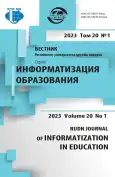Formation of digital communication in the organizational and pedagogical activity of the university
- Authors: Zotova A.S.1
-
Affiliations:
- K.G. Razumovsky Moscow State University of Technologies and Management
- Issue: Vol 20, No 1 (2023)
- Pages: 20-32
- Section: MANAGEMENT OF EDUCATIONAL INSTITUTIONS IN THE INFORMATION ERA
- URL: https://journal-vniispk.ru/2312-8631/article/view/321285
- DOI: https://doi.org/10.22363/2312-8631-2023-20-1-20-32
- EDN: https://elibrary.ru/BLCLNC
- ID: 321285
Cite item
Full Text
Abstract
Problem statement. The active development of digital technologies has had a serious impact on the field of education and led to the formation of a new information and communication environment at universities. Within the framework of the study, the features of the formation of digital communication of organizational and pedagogical activity of a modern university were considered. Methodology. The main methods chosen are a SWOT analysis of opportunities and threats associated with the introduction of the digital environment at the university, and a sociological survey to assess the attitude of all participants in the educational process to the digitalization of the university. Results. The study of the process of digital communication of the university's activities made it possible to design a pilot communication model of organizational and pedagogical activity of the university in a new digital environment. The trends in the development of the knowledge society focused on the activities of higher educational institutions and the sphere of educational services are also identified. The main provisions in the field of the processes of formation of elite consciousness and professional domestic elite capable of continuing the development of progress have been formed. Conclusion. The proposed pilot version of modeling the digital environment of the university helped to formulate the basic requirements for the organization of higher school activities and highlight the current directions of development: activation of innovative and creative potential of students, scientific and project activity of the teaching staff, improvement of the competence-based professional level of training of personnel and employees of the university, contributing, among other things, to personal development and increased labor efficiency. This strategy will help the university become a brand and take a stable position in a competitive environment, create stable economic development, and, as a result, expand partnerships, scientific and educational projects that give the right to enter the modern socio-cultural space of the country and the world.
About the authors
Anna S. Zotova
K.G. Razumovsky Moscow State University of Technologies and Management
Author for correspondence.
Email: annazot@bk.ru
ORCID iD: 0000-0002-0025-5332
PhD, Docent of the Department of Public Processes, Mass Media and Advertising Technologies
73 Zemlyanoi Val St, Moscow, 109004, Russian FederationReferences
- Targowski A. Digital education strategies. Filozofia i Nauka. 2022;1(10):117–126. https://doi.org/10.37240/FiN.2022.10.1.11
- Goncharova MA, Goncharova NA. Reboot of the higher education system in the conditions of formation of the digital educational environment in the Russian Federation. Psychological and Pedagogical Journal Gaudeamus. 2019;18(4):7–14. (In Russ.) https://doi.org/10.20310/1810-231X-2019-18-4(42)-7-14
- Heerden van D, Goosen L. Information and communication technologies to change education. Proceedings of the South Africa International Conference on Education. 2020. p. 241–250. Available from: https://www.researchgate.net/publication/346717946_Information_and_Communication_Technologies_to_Change_Education (accessed: 10.03.2022).
- Klimov AA, Zarechkin EYu, Kupriyanovskij VP. About the digital ecosystem of a modern university. Modern Information Technologies and IT Education. 2019;15(4):815–824. (In Russ.) https://doi.org/10.25559/SITITO.15.201904.815-824
- Vanyushkina VV. The brand of the university in the digital educational environment. Bulletin of the Rostov State University of Economics. 2019;(4):26–33. (In Russ.)
- Bespalov AI. University autonomy: a classical approach to innovation management. Values and Meanings. 2012;(2):71–76. (In Russ.)
- Kostyleva SU. University as an economic institution. Bulletin of the Tambov University. Series: Humanities. 2011;(10):38–44. (In Russ.)
- Sanchez JJC, Aleman ECh. Teachers’ opinion survey on the use of ICT tools to support attendance-based teaching. Computers & Education. 2011;56(3):911–915. https://doi.org/10.1016/j.compedu.2010.11.005
- Usacheva OV, Chernyakov MK. Assessment of the readiness of universities to transition to a digital educational environment. Higher Education in Russia. 2020;29(5):53–62. (In Russ.) https://doi.org/10.31992/0869-3617-2020-29-5-53-62
- Rabadanova RS, Kagosyan AS, Karmanova ZhA, Rabadanova ZM, Titov V. Motivational support as a factor of formation of students’ professional competence in the conditions of digitalization of education. Revista on line de Gestao e Politica Educational. 2022;26(S2). https://doi.org/10.22633/rpge.v26iesp.2.16547
- Gureeva AN. Social networks as part of modern media communications of the Russian university. Bulletin of the Moscow University. Series 10: Journalism. 2015;(6):148–161. (In Russ.)
- Kuzmin PА. The semiotic method of cognition of reality: limits of applicability. RUDN Journal of Language Studies, Semiotics and Semantics. 2019;10(3):610–621. (In Russ.) https://doi.org/10.22363/2313-2299-2019-10-3-610-621
- Romanova GV. Digitalization of higher education: new trends and experience of implementation. Humanities. 2020;(4):31–36. (In Russ.)
- Tyukavkin NM. Digitalization of educational processes in universities. Expert: Theory and Practice. 2019;(1):35–41. (In Russ.) https://doi.org/10.24411/2686-7818-2019-00016
Supplementary files









